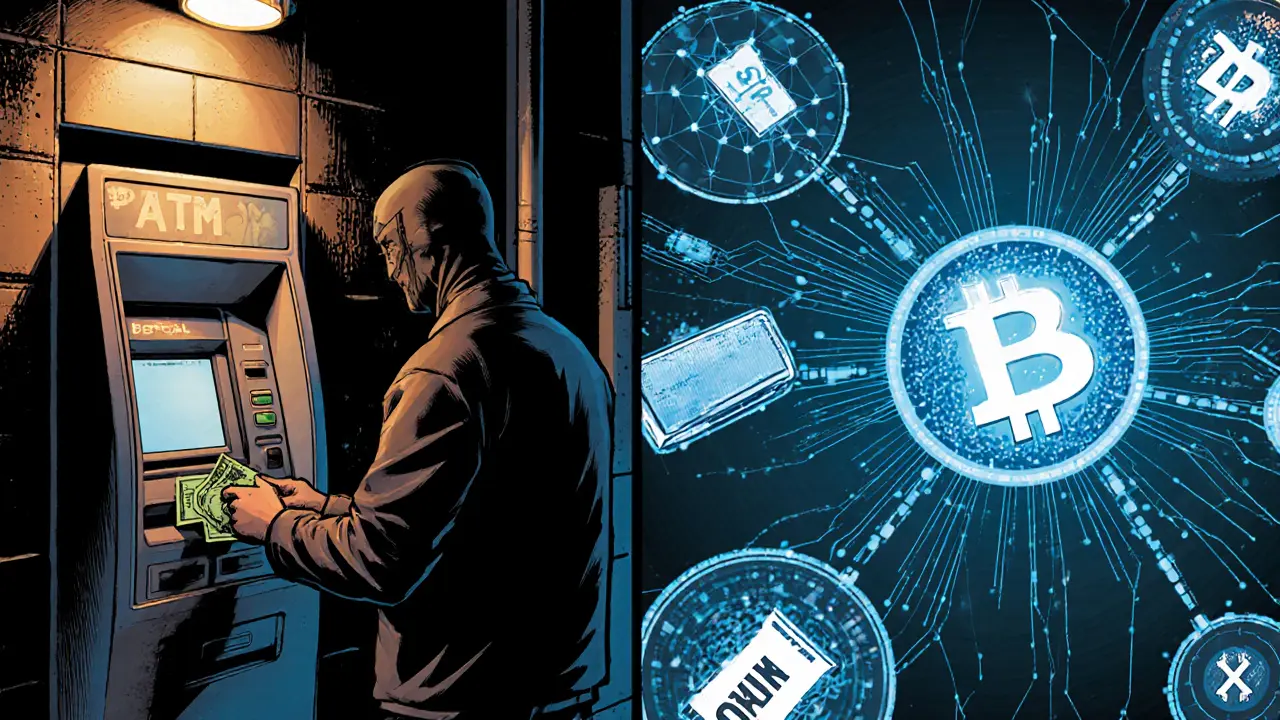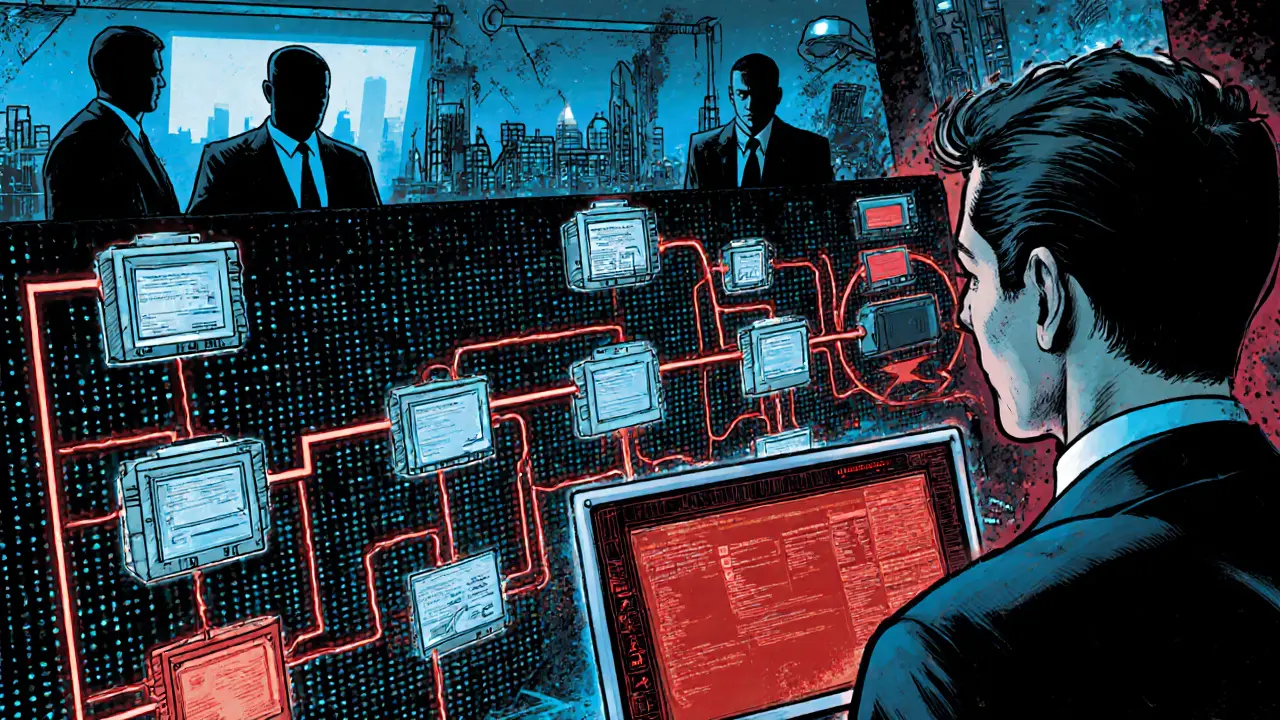UK Sanctions Violation Penalty Calculator
How UK Sanctions Fines Work
The UK can impose fines up to £1 million or 50% of the transaction value (whichever is higher) for sanctions violations. These penalties increase with:
- Frequency of violations
- Total transaction volume
- Intentionality of violations
Important: This calculator estimates potential penalties based on UK sanctions regulations. Actual fines depend on OFSI's assessment of compliance efforts, intent, and cooperation with regulators.
When the UK government slapped sanctions on Russian banks in 2022, they didn’t just freeze bank accounts. They also started tracking cryptocurrency wallets. And by 2025, it’s clear: if you run a crypto business in the UK and aren’t actively monitoring for sanctions violations, you’re already in danger.
Why Crypto Isn’t Safe from Sanctions Anymore
Cryptocurrency was once seen as a way to move money outside the reach of governments. That idea is dead. The UK’s Office for Financial Sanctions Implementation (OFSI) released a hard-hitting report in July 2025 showing that crypto-assets are now a major tool for sanctions evasion. Between January 2022 and May 2025, over 7% of all reported sanctions breaches in the UK came from crypto firms. That’s not a glitch. That’s a pattern. The problem isn’t just bad actors. It’s complacency. Many crypto companies still treat sanctions screening like a checkbox exercise-run a name against a list, and call it done. But blockchain doesn’t work that way. Money moves through dozens of wallets, gets mixed, swapped, and layered across chains. A transaction might start at a regulated exchange, pass through a decentralized protocol, then land in a wallet tied to a sanctioned entity. If your system can’t trace that path, you’re blind.Who Exactly Has to Comply?
If your business touches crypto in the UK, you’re regulated. The Financial Conduct Authority (FCA) requires registration for any firm that:- Exchanges crypto for pounds or euros
- Runs a crypto ATM
- Provides custodial wallet services
- Issues new tokens through ICOs or IEOs
- Facilitates peer-to-peer crypto trades
The Hidden Compliance Gap
OFSI’s most alarming finding? UK crypto firms are under-reporting sanctions breaches. Since August 2022, the number of self-reported incidents has been far lower than what experts believe is actually happening. That’s not an accident. It’s a symptom of weak systems and fear of penalties. Think about it: if you spot a transaction linked to a sanctioned wallet, you have to report it to OFSI. But reporting could mean losing customers, triggering audits, or even criminal liability. So some firms ignore red flags. Others assume the transaction is a false positive. But OFSI isn’t fooled. They’ve built forensic models that can trace transaction patterns even when names are hidden. The message from regulators is clear: passive compliance is dead. You can’t wait for a customer to get flagged. You need to be scanning every transaction in real time.
What Tools Do You Actually Need?
You can’t use your bank’s AML software to monitor crypto. Traditional tools look for names, addresses, and account numbers. Blockchain doesn’t have those. It has public wallet addresses, transaction hashes, and chain movements. To stay compliant, you need:- Blockchain analytics platforms like Chainalysis, Elliptic, or TRM Labs that map wallet relationships and flag known sanctioned addresses
- Real-time monitoring that checks every incoming and outgoing transaction against OFSI’s updated sanctions list
- Transaction clustering to identify when multiple wallets are controlled by the same entity
- Travel Rule compliance to collect and share sender/receiver info for transfers over £1,000
Real Cases: How Sanctions Are Being Bypassed (And Caught)
The UK hasn’t just issued warnings. They’ve acted. In early 2025, OFSI sanctioned the Grinex and Meer crypto exchanges after uncovering their role in moving funds for Russian military suppliers. One exchange, Grinex, processed over $400 million in transactions tied to sanctioned banks. Even more telling was the case of A7A5, a rouble-backed token created specifically to evade sanctions. It moved $9.3 billion in just four months. The UK, working with US authorities, traced the token’s flow through multiple decentralized exchanges and identified the developers behind it. They froze the wallets and shut down the infrastructure. These aren’t isolated cases. There are now over 2,700 active UK sanctions targeting Russian individuals, companies, and financial networks. And more than 100 of those targets have direct links to crypto wallets.What’s Changing in 2025?
The UK is moving fast. By the end of 2025, new legislation will formally recognize cryptocurrency as personal property under English law. That means crypto assets can be seized, frozen, and inherited like any other asset. The FCA is also rolling out stricter rules on crypto advertising. You can no longer promote crypto as a “guaranteed return” or downplay the risks. Violations can lead to fines or being banned from marketing entirely. And HMRC is stepping up. They’re now cross-referencing crypto transaction data with tax filings. If you’re making profits from crypto and not declaring them, you’re at risk-not just from OFSI, but from tax authorities too.
What Happens If You Don’t Comply?
The penalties are severe:- Fines up to £1 million or 50% of the value of the breach (whichever is higher)
- Criminal prosecution for individuals involved in deliberate evasion
- License revocation by the FCA
- Reputational collapse-customers and partners will flee
How to Get Ahead of the Curve
You don’t need to be a tech giant to comply. But you do need to act. Here’s what to do now:- Map your exposure-Which crypto assets do you handle? Which wallets do you interact with? Which jurisdictions do your customers come from?
- Upgrade your screening tools-Invest in blockchain analytics. Don’t wait for OFSI to find you.
- Train your team-Compliance officers need to understand blockchain, not just Excel spreadsheets.
- Document everything-If you’re audited, you need to prove you’re doing the work. Logs, alerts, reports, and decisions matter.
- Report suspicious activity-Even if you’re unsure. It’s better to file a weak report than miss a real one.
Final Reality Check
Crypto isn’t going away. But the wild west era is over. The UK has made it clear: if you want to operate here, you play by the rules. And those rules now include real-time monitoring, blockchain tracing, and full transparency. The firms that survive aren’t the ones that made the most money in 2021. They’re the ones that built compliance into their DNA-from day one.Are crypto transfers completely anonymous under UK law?
No. While blockchain transactions are pseudonymous, UK regulators require crypto firms to collect and verify customer identities under AML rules. Wallets linked to sanctioned entities are flagged and tracked using blockchain analytics tools. Even decentralized transactions can be traced back to exchanges or service providers that are regulated.
Can I use a non-UK crypto exchange to avoid sanctions?
No. If you’re based in the UK or serve UK customers, you’re still bound by UK sanctions laws-even if you use a foreign exchange. OFSI has jurisdiction over any activity involving UK persons, assets, or financial systems. Using offshore platforms to bypass sanctions is still a criminal offense.
What happens if I accidentally transact with a sanctioned wallet?
If it was truly accidental and you report it immediately, you may avoid criminal charges. But you’ll still face regulatory scrutiny and possible fines. The key is proving you had proper systems in place. Ignorance isn’t a defense-lack of due diligence is.
Do I need to screen every single crypto transaction?
Yes. The FCA and OFSI expect real-time screening of all incoming and outgoing transactions for customers subject to sanctions. This includes both fiat-to-crypto and crypto-to-crypto trades. Automated tools are required-manual checks won’t cut it anymore.
Is crypto mining subject to UK sanctions?
Not directly. But if you’re mining crypto using hardware or electricity provided by a sanctioned entity, or if the mined coins are sent to a sanctioned wallet, you could be implicated. Mining firms must still screen their payout addresses and avoid connections to known bad actors.



David Roberts
November 2 2025Let’s be real-OFSI’s entire model is built on the assumption that blockchain is a ledger you can police like a bank statement. But wallets aren’t accounts. Addresses aren’t identities. You can’t trace a transaction through 12 hops and say ‘this is bad’ without 70% false positives. The tech isn’t there. The regulators are just screaming into a void.
And don’t get me started on ‘real-time monitoring.’ You want me to scan 20,000 tx/min with Chainalysis? That’s a $500k/year line item. For a startup? That’s suicide. They’re not enforcing compliance-they’re enforcing consolidation.
Also, ‘self-reporting’ is a trap. Report a false positive? You get audited. Miss one? You get fined. It’s a no-win game designed to kill small players. The system isn’t broken-it’s rigged.
Beth Devine
November 4 2025David’s point about false positives is spot-on, but the solution isn’t to give up-it’s to build smarter. Tools like TRM Labs and Elliptic have improved their clustering algorithms dramatically in the last 18 months. You can now reduce false positives by 60%+ with proper configuration.
And yes, it’s expensive-but think of it as insurance. One fine = 3 years of software costs. The firms that survive 2025 aren’t the ones with the biggest wallets. They’re the ones who treated compliance as product development, not a legal checkbox.
Brian McElfresh
November 4 2025They’re lying. All of it. The UK doesn’t care about sanctions-they care about control. This is just the next step in the Great Crypto Purge. The same people who told us crypto was ‘untraceable’ are now the ones pushing ‘real-time monitoring.’ They want to turn every wallet into a monitored bank account.
And don’t think this stops at Russia. Next it’s activists. Then journalists. Then anyone who buys Bitcoin without asking permission. This isn’t regulation. It’s digital authoritarianism dressed up in compliance jargon.
Hanna Kruizinga
November 6 2025Wow. So we’re just supposed to trust the government’s ‘forensic models’? They can’t even track tax fraud properly. Now they’re gonna magically trace crypto through 15 different chains and mixers? Please. This is theater. The real goal is to scare small exchanges into selling to the big boys. And guess who owns Chainalysis? Big finance. This is a power grab.
Also, ‘travel rule’? You mean forcing me to hand over my customers’ private keys? That’s not compliance. That’s betrayal.
David James
November 7 2025I’m not a tech guy but I get this. If you’re running a crypto business in the UK, you need to take this seriously. No excuses. The fines are real. The audits are real. The lost licenses are real.
Start small. Use a basic blockchain scanner. Train one person on it. Log everything. Don’t wait until you get caught. Do it now. It’s not about being perfect-it’s about being proactive. And yeah, it sucks. But so does losing your business.
Shaunn Graves
November 8 2025Who the hell wrote this article? A PR flack for Chainalysis? You talk about ‘over 7% of sanctions breaches’ like it’s a crisis-but that’s 93% of breaches happening through traditional finance. Why isn’t the FCA shutting down Barclays for laundering Russian oligarchs’ cash? Because they’re too big to fail.
Crypto firms are the new scapegoats. The real criminals? The banks. The regulators? Complicit. This whole thing is a distraction so no one asks why HSBC still has access to the UK’s financial system while a tiny exchange gets fined £2.4M for one bad transaction.
Jessica Hulst
November 10 2025There’s a deeper question here, and no one’s asking it: if the state can now treat a string of hexadecimal characters as ‘property’ subject to seizure, what does that say about the nature of ownership in a digital age?
We’ve moved from ‘my money’ to ‘your data.’ Wallets aren’t just accounts-they’re digital extensions of personhood. When OFSI freezes a wallet, they’re not freezing an asset-they’re freezing a person’s ability to exist economically. And we’re supposed to be okay with that because ‘it’s for sanctions’?
What happens when the next target isn’t a Russian oligarch but a Ukrainian dissident? Or a Hong Kong activist? Or a climate protester? The tools are already built. The precedent is set. The question isn’t ‘can they do this?’ It’s ‘who’s next?’
Kaela Coren
November 12 2025Compliance frameworks in the UK have evolved from reactive to predictive. The shift from KYC to KYT (Know Your Transaction) is not merely technological-it’s epistemological. The regulatory ontology now treats blockchain as a transparent, deterministic system, despite its inherent probabilistic nature.
Statistical clustering models, when calibrated with on-chain behavioral analytics, can infer entity linkage with >85% confidence. This is not surveillance. It is risk stratification.
That said, the operational burden on SMEs remains disproportionate. A regulatory sandbox for compliant startups, with tiered compliance obligations based on volume and jurisdictional exposure, would be a more equitable solution.
alvin Bachtiar
November 13 2025Let’s be honest-this whole thing is a circus. OFSI’s ‘forensic models’? They’re basically glorified Google searches on the blockchain. You think they can trace A7A5? Nah. They got lucky. The devs used a known exchange exit point. That’s not genius. That’s a rookie mistake.
Meanwhile, the real money movers? They’re using ZKPs, private pools, and chain-hopping through Layer 2s that don’t even log IPs. The regulators are chasing ghosts while the actual criminals laugh all the way to the bank.
And don’t get me started on ‘Travel Rule.’ You want me to send your name and address every time I send 1000 GBP? That’s not compliance. That’s surrender. We’re turning Bitcoin into PayPal with extra steps. 🤡
Josh Serum
November 15 2025Look, I get the fear. But this isn’t the end of crypto-it’s the beginning of maturity. We’ve had 10 years of wild west. Now it’s time to grow up.
Yes, compliance is a pain. But imagine if every bank had to check every transfer like this? We’d be way safer. This isn’t about control. It’s about responsibility.
Do the work. Buy the tools. Train your team. It’s not optional anymore. And if you’re scared? That’s okay. Just don’t pretend you’re being persecuted. You’re not. You’re just being asked to do the right thing.
Chris Strife
November 15 2025UK sanctions are a joke. You think Russia cares about your frozen wallets? They’ve got Chinese banks, Iranian miners, and North Korean hackers. Your ‘compliance’ is a paper tiger.
Meanwhile, you’re crushing small businesses while the real criminals laugh. This isn’t justice. It’s performative politics. You want to stop sanctions evasion? Sanction the banks. Sanction the politicians. Don’t punish the devs who built the tech.
And if you think this stops at crypto? You’re delusional. Next it’s cash. Then crypto mining rigs. Then your phone. Welcome to the surveillance state.
Wesley Grimm
November 15 2025Every single point in this article is technically correct. But the underlying assumption-that crypto firms are the primary vector for sanctions evasion-is dangerously misleading.
Over 90% of sanctioned funds still move through SWIFT, shell companies, and offshore real estate. Crypto represents a tiny fraction. So why are we targeting the weakest link?
The answer: because it’s easier. It’s cheaper. It’s politically safe. And it lets the real culprits off the hook. This isn’t enforcement. It’s scapegoating dressed in blockchain analytics.
Masechaba Setona
November 17 2025Oh wow. So now the UK is the moral police of global finance? Who elected them? The UN? The people? No. They just decided they’re the arbiters of justice because they have a fancy parliament and a queen who’s dead.
Meanwhile, in South Africa, we just got our first crypto license and no one’s asking for ‘real-time monitoring.’ Why? Because we don’t pretend to be the world’s financial cops.
This isn’t about compliance. It’s about colonialism with API keys.
Kymberley Sant
November 18 2025so like… if i use metamask and send eth to a friend who uses coinbase… am i still responsible for what they do? like what if they send it to a sanctioned wallet later? do i get fined for their bad choices? 🤔
also why does everyone say ‘chainalysis’ like its the bible? its a company. they make money off this stuff. not a god.
Matthew Affrunti
November 18 2025Just want to say-this is the most important thing I’ve read all year. I run a small crypto ATM in Manchester. I’ve been terrified to even think about sanctions. But now I get it.
I’m ordering Chainalysis today. I’m training my staff. I’m documenting every transaction. It’s scary. But I’d rather be scared than broke.
If you’re reading this and you’re in the same boat-you’re not alone. Let’s do this right.
mark Hayes
November 18 2025big picture time: crypto was supposed to be free money. now it’s just another bank account with more steps.
but honestly? i’m okay with that. if it means my grandma can send money to her grandkids without paying 15% in fees? i’ll take the monitoring.
just don’t make it so expensive that only the big guys survive. we need diversity in this space. not just 3 corporations running everything.
and yes i know i spelled ‘dont’ wrong. 🤷♂️
Derek Hardman
November 19 2025As a compliance officer for a UK-based fintech, I can confirm: the regulatory expectations have shifted from ‘reasonable care’ to ‘demonstrable diligence.’
It’s no longer sufficient to say ‘we use a third-party tool.’ You must document configuration, tuning, false positive rates, escalation protocols, and staff training logs.
Our internal audit team now reviews every flagged transaction. If we miss one, we’re liable. The bar has been raised-not because regulators are harsh, but because the risk landscape has evolved.
Adaptation isn’t optional. It’s existential.
Eliane Karp Toledo
November 20 2025They’re lying about A7A5. That token was never used to evade sanctions. It was a test by the UK government to see if they could trace it. They created it. They funded it. They then ‘caught’ it to justify the crackdown.
Think about it-why would anyone build a token that moves $9B in 4 months and never use it for anything else? It’s a honeypot. A trap. A false flag operation disguised as enforcement.
Next time they’ll say ‘we found a crypto wallet linked to a terrorist’-but it’ll be one they created. They’re not fighting crime. They’re manufacturing it.
Phyllis Nordquist
November 21 2025Thank you for this comprehensive breakdown. The most overlooked point is the distinction between registration and compliance. Many firms assume FCA registration equals safety. It does not. Registration is the entry ticket. Compliance is the ongoing journey.
One practical tip: implement a triage system for alerts. Not every flagged address is a threat. Prioritize based on transaction volume, velocity, and chain context. This reduces operational fatigue and improves accuracy.
Also-document your decision tree for false positives. Regulators love to see logic, not luck.
David Roberts
November 21 2025Phyllis, you’re right about triage-but who’s going to pay for the engineers to build that system? The ‘decision tree’ you’re talking about requires ML models trained on real sanctions data. That data isn’t public. OFSI won’t share it. So we’re building blindfolded.
And ‘documenting your logic’? That’s just a way to get sued later. Every decision you write down becomes evidence. If you miss one, they’ll say ‘you knew but chose to ignore.’
This isn’t compliance. It’s legal suicide with extra steps.